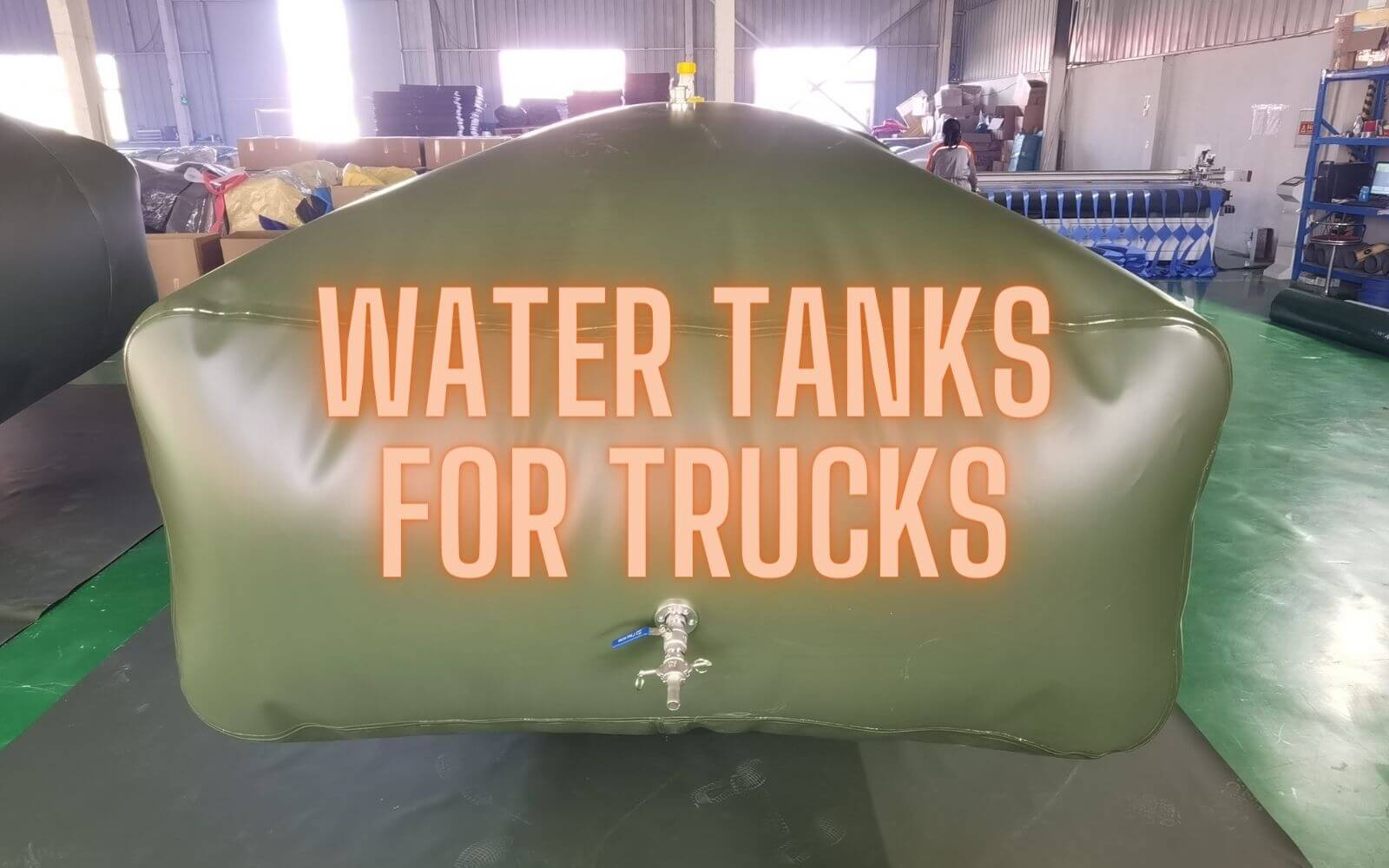WATER TANKS FOR TRUCKS
In the realm of mobile water storage, the evolution from rigid tanks to flexible water bladders marks a significant leap forward. Flexible water bladders, also known as flexible pillow bladdersPillow Tank or pillow tanks, are transforming how water stored and transported on trucks, offering a host of advantages that solve the problems which caused by the limitations of traditional tanks. This article dives into the world benefits of using flexible water bladders for trucks, highlighting their impact on efficiency on deployment and cost, applications of versatility, and overall utility.
Flexibility of shape:
One of the standout benefits of flexible water bladders is their exceptional versatility. Unlike rigid tanks, which come in fixed shapes and sizes, flexible bladders can be custom-made to fit various truck dimensions and capacities. This adaptability allows it to use with available space on trucks, ensuring that water storage needs are met no neef to reduce on the truck’s load capacity.
Easy fits on truck:
Flexible water bladders can be easily installed in different types of trucks, from small pickup trucks to large commercial vehicles. Their ability to conform to the shape of the truck bed or cargo area maximizes storage efficiency and minimizes wasted space. This is particularly advantageous for industries that require mobile water storage solutions, such as agriculture, construction, firefighting, and disaster relief operations.
Cost-effective on installation:
Installing and removing traditional rigid water tanks can be a labor-costly and time-consuming process. In contrast, flexible water bladders offer a user-friendly choice. These bladders are lightweight and can easily place into place, requiring minimal manpower and equipment for installation. When the bladder no longer needed, it can quickly deflate, fold, and store compactly, freeing up valuable space on the truck.
Easy switch:
The simplicity of installation and removal also means that trucks can work in different tasks with minimal operation. This flexibility is particularly beneficial for businesses that need to switch between various operations, enhancing overall productivity and efficiency.
Robust water tanks for trucks:
Modern flexible water bladders use high-quality, durable materials such as reinforced PVC or TPU (thermoplastic polyurethane). These materials design to withstand harsh environmental conditions(working temperature ranges from -40~90 clecus degree), including extreme temperatures, UV exposure(UV resistance added), and abrasion(anti-abrosion added). As a result, flexible bladders offer excellent longevity and reliability, ensuring that water remains safety stored and uncontaminated during transport.
Safer and commercial choice:
The robust construction of flexible water bladders also makes them resistant to punctures and avoiding leaks, providing a safer and more reliable water storage solution compared to traditional ones, more brittle rigid tanks. Regular maintenance and proper handling further extend the lifespan of these bladders, offering a cost-effective investment for businesses.
Economic choice:
Flexible water bladders present a cost-effective solution for mobile water storage. The initial purchase cost of a flexible bladder is often lower than traditional rigid tanks. Additionally, the reduced need for specialized installation equipment and labor further lowers overall costs. The longevity and durability of flexible bladders also mean fewer replacements and repairs, leading to long-term savings.
One truck, multi-utilization:
Moreover, the ability to easily remove and store flexible bladders when not in use allows businesses to utilize their trucks for other purposes without the need for permanent modifications. This multi-use capability maximizes the return on investment for truck owners and operators.
Why custom tank is better choice of water tanks for trucks:
Flexible water bladders offer unparalleled customization options, making them a versatile choice for multi-purposr liquid storage needs in different working places. Unlike rigid tanks, which come in predetermined shapes and sizes, flexible water bladders can customize to meet specific requirements on shape and sizes, based on the limited trunk shape amd sizes. This customization extends to dimensions, capacities, and even the types of materials used, ensuring that the bladder fits perfectly within the available space on a truck.
Flexible designs:
This flexibility in design means that trucks of different sizes and configurations can be equipped with water bladders that maximize storage capacity while minimizing wasted space. For businesses that operate a diverse fleet, this ability to customize ensures that each vehicle can be outfitted with an optimal water storage solution, enhancing overall operational efficiency, less cost and better solution.
Custom features:
Moreover, custom features such as multiple fill and discharge ports, integrated fittings, and reinforced sections can be added based on specific needs. This level of customization allows for seamless integration with existing systems and processes, making the handling, transport, and distribution of water more efficient and user-friendly.
Custom tanks for various applications:
The adaptability of flexible water bladders to various environments and applications underscores their value. Whether it’s for agriculture, firefighting, construction, or emergency response, these bladders specifically fit to meet the unique demands of each use case. This innovative storage approach ensures that businesses can rely on a water storage solution with their operational needs, leading to better performance and higher satisfaction.
The adoption of flexible water bladders for trucks represents a revolutionary step forward in mobile water storage solutions. Their versatility, ease of installation, durability, cost-effectiveness, and environmental benefits make them an ideal choice for a wide range of applications. As industries continue to seek innovative and efficient ways to store and transport water, flexible water bladders are playing a pivotal role in shaping the future of water logistics.








